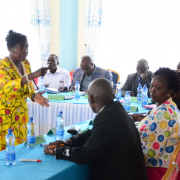Makini School Kibos campus was founded in 2012 and comprises Classes 4 to 8.The school is located on a vast piece of land of about 600 acres overlooking the magnificent Nandi Hills. It is about 4 kilometers from Kisumu City. The school strives to mould its learners into top performers not only in academics but in whatever they pursue. The learners are taught important values such as integrity and discipline as well as skills such as critical thinking and problem solving that are all key in today’s evolving world. The school has a population of 422 pupils of which 101 are in boarding. There are 27 teachers and 41 support staff.

Even though the main Makini School Nairobi campus joined the Eco-schools program in 2007, the Kibos campus joined in 2017. However, the school has always been keen in promoting environmental conservation evidenced by the several green projects in the schools. These projects are usually spearheaded by the environmental club. The main objective of the club is to empower children with knowledge, skills and values necessary for environmental conservation and to equip them with life skills.
As part of the Eco-school activities, the school has a number of student-centered environmental projects. Some of the projects include; rabbitry, poultry keeping, indigenous vegetables farming, orchard farming, waste recycling, tree growing and water harvesting. All students, teachers, school management and at times community members participate in the implementation of these noble environmental projects. The projects are aimed enhancing learner engagement in environmental activities and improving the learning environment. The projects are also a response to climate change and also aim at making the school self-sufficient. The school gets most of its fruits, vegetables, eggs and chicken meat from the projects. The orchard also serves as the resource center for extension learning within the school as it is learning and teaching resource.
Due to the school’s exemplary projects, the school was included in a project aimed at promoting green enterprise development in schools dubbed Schools Green Challenge from 2017-2018. The challenge was implemented under a collaborative partnership between KOEE and Micro Enterprises Support Programme Trust (MESPT) as part of the Eco-schools Programme. The school emerged as winners among 12 other participating schools. As part of the Challenge, the school ventured into fish farming. The school has 2 fish ponds each with 900 tilapia fish and 100 cat fish for population control. The school now produces over 10,000 fish after every 6 months. This is targeted for about 40,000 consumers when harvested at the same time.
The school has about 100 students who board. This provides the fish business with ready market as the school serves fish every Wednesday and Friday of the week for the borders. With the school spending about Kshs. 20,000 (190 USD) on fish per week, this is a sure weekly income for the project.
Through the projects, the school has been able to inspire the students to be eco-entrepreneurs. The school strives to be a sustainability and climate action model school by indulging into climate smart actions. For instance they organically grow their food which is irrigated using harvested rain water. This cuts their carbon footprint in the long run.


Leave a Reply
Want to join the discussion?Feel free to contribute!